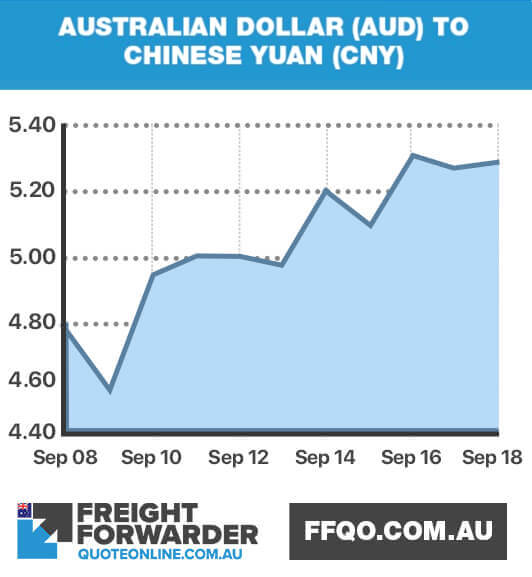Home » News »
Chinese Yuan devaluation- good or bad for Australian importers and exporters?
« Previous | Next »
August 24th was declared “Black Monday” after the Chinese Yuan devaluation reached its lowest swing in the stock market. This sent off a wave of global currency fluctuation and created a huge concern on its effects to the import and export industries. Questions have since been raised on whether it is really a good or bad thing for importers and exporters, and, how long the effects might last.
Below is a list of the implications it has brought and will bring to:

See the Australian Dollar (AUD) to Chinese Yuan Renminbi (CNY) History
Implications of the Chinese Yuan devaluation to Australian importers
As far as the Australian importers and exporters are concerned, the devaluation of the Chinese currency translates to a higher value for the Australian dollar – which is good news for Australian importers.
As the Chinese currency gets lower, it gives more buying powers for Australian importers. Chinese products are now cheaper and this means potentially bigger profits for them.
Watch this video to learn more:
Australia feeling the impact of weakening yuan
Implication of the Chinese Yuan devaluation to Australian exporters
The Chinese Yuan devaluation may be good news to Australian importers, but it is a different ball game for Australian exporters.
China gets a large chunk of the Australian export market – in fact over a quarter of the total number of export products from Australia goes to China. This image below shows it:

Impact of Chinese Yuan devaluation to Australian exporters
Due to the devaluation of the Chinese currency, Chinese buyers might need to find alternative sources of raw materials that are cheaper. This could mean resorting to buying native products unless the product is not available anywhere in their country. Thus, Australian exporters could consider developing opportunities to develop or increase trade to other parts of the world where pricing is more favourable, especially if the Chinese Yuan devaluation continues to fall.
Implications of the Chinese Yuan devaluation to Australian consumers and the stock market
Generally, the Yuan devaluation is good news for Australian consumers. It gives more value to their money which provides them better buying capacity as Chinese products being sold cheaper. Sadly, it isn’t the same for the Australian stock market.
The stock market is seen static at this time. Many of the speculators are saying that buyers will hang their decision a bit to wait for further soaring down of prices. However, there is the danger of this affecting the currency of other countries including Australia, as this may undermine inflation and result in a delayed rate rise.
Implications of the global market
The Chinese Yuan devaluation can equate to a global deflation. Goods coming from China are expected to become cheaper in the future, and this can also undermine the spending behaviour of consumers and businesses.
For countries like Australia, which experienced a sluggish economic advancement over the past few years, this can be both a tough and an easy time, depending on what commodities are being traded.
The future of Australian importers and exporters
Speculators are saying that the Chinese Yuan devaluation could be a prelude to a global depreciation. However, analysts are optimistic that this is a momentary toll of events, especially for stable markets like Australia.
Chinese merchants and sellers had proven in the past that they can sustain business with very small profit on each item. Thus, this may be seen as a short belt-tightening times for China. Soon, the Yuan may just be able to get back to previous levels, especially if China’s business policy is adjusted.
Australian traders may gain valuable lessons and experience from the Chinese Yuan devaluation. It is an opportunity for them to hold fast to their trading influence while exploring new avenues for their business.
Find out more about Freight Forwarder Quote Online Australia and Freight Forwarding or follow us on our Linkedin profile to remain updated for our upcoming blogs regarding for you to remain posted of the recent Trade Agreement, freight and customs news.
Check out our other recent articles
Latest news
Read up on the latest Australian freight forwarding news and developments:
Marine cargo insurance, should you buy it? - 28 May 2023
Aus UK FTA 2023 highlights in of the new free trade agreement - 07 Apr 2023
Types of cargo shipped via sea freight - 05 Mar 2023

Get social with us
Check us out on Facebook. Get social and like our page. Feel free to post your thoughts - we will appreciate it.
Come see our clips on our YouTube channel and subscribe so you are notified when we add new ones.
To keep up to date with the industry and read up on industry trends and developments, follow us on LinkedIn.
For quick updates, follow us on Twitter.
1300651233